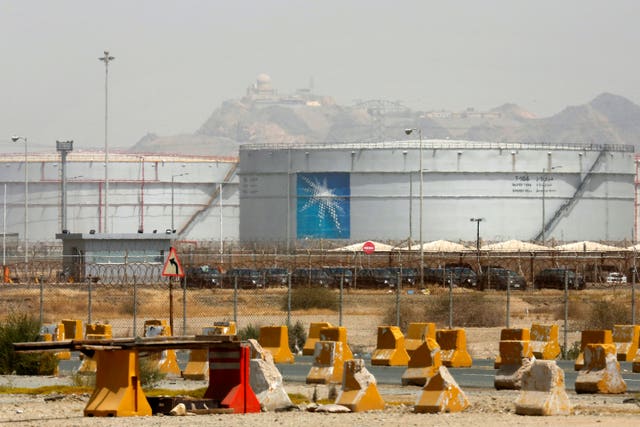
Saudi Arabia has said it will extend its unilateral production cut of one million barrels of oil a day to the end of September in its effort to boost flagging energy prices.
The Saudi cut of one million barrels per day, which began in July, comes as the other OPEC+ producers have agreed to extend earlier production cuts to next year.
The kingdom announced the extension in a statement on the state-run Saudi Press Agency, quoting an anonymous official in the kingdom’s Energy Ministry. The official added that the cut “can be extended or deepened” if the need arises.
“This additional voluntary cut comes to reinforce the precautionary efforts made by OPEC+ countries with the aim of supporting the stability and balance of oil markets,” the official said.
The move was widely expected by analysts.
Benchmark Brent crude traded at over 80 US dollars (£63) a barrel on Thursday.
 Saudi Arabia said it will extend its unilateral production cut of 1 million barrels of oil a day to the end of September (AP Photo/Amr Nabil, File)
Saudi Arabia said it will extend its unilateral production cut of 1 million barrels of oil a day to the end of September (AP Photo/Amr Nabil, File)
A series of production cuts over the past year has failed to substantially boost prices amid weakened demand from China and tighter monetary policy aimed at combatting inflation. Brent has largely hovered between 75 and 85 dollars a barrel since last October.
The Saudis are particularly keen to boost oil prices in order to fund Vision 2030, an ambitious plan to overhaul the kingdom’s economy, reduce its dependence on oil and create jobs for a young population. The plans include several massive infrastructure projects, including the construction of a futuristic 500 billion dollar (£393 billion) city called Neom.
Higher prices would also help Russian President Vladimir Putin fund his war on Ukraine, as Western countries have used a price cap to try to cut into Moscow’s revenues.
Western sanctions mean Moscow is forced to sell its oil at a discount to countries like China and India.
Its estimated export revenue fell by 1.4 billion dollars (£1.1 billion) to 13.3 billion (£10.5 billion) in May, down 36% from a year ago, the International Energy Agency said in a report in June.


Comments: Our rules
We want our comments to be a lively and valuable part of our community - a place where readers can debate and engage with the most important local issues. The ability to comment on our stories is a privilege, not a right, however, and that privilege may be withdrawn if it is abused or misused.
Please report any comments that break our rules.
Read the rules here